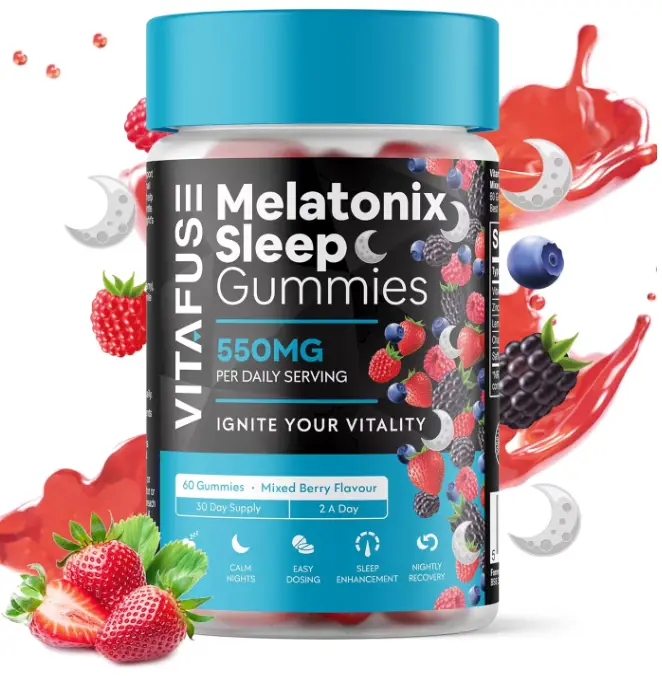
In a world where the quest for a good night’s sleep has become the Holy Grail of modern living, the choices available for sleep aids can be bewildering. Among these, sleeping pills and gummies stand out as popular choices. But what’s the difference between sleeping pills and gummies, and how do you know which one is right for you?
What’s the Difference Between Sleeping Pills and Gummies? The primary difference between sleeping pills and gummies lies in their form, ingredients, and how the body absorbs them. Sleeping pills, often prescription-based, contain potent pharmaceutical compounds that induce sleep. In contrast, gummies usually contain natural supplements like melatonin and herbal extracts, offering a gentler approach to improving sleep quality.
Understanding Sleeping Pills
Sleeping pills are medications prescribed to address various sleep disorders, including insomnia. They’re known for their efficiency in inducing sleep, but come with considerations:
- Prescription vs. Over-the-counter (OTC): Prescription sleeping pills are stronger and require a doctor’s approval, while OTC options are more accessible but might be less potent.
- Active Ingredients: Common ingredients include benzodiazepines, non-benzodiazepines (such as zolpidem), and antidepressants, each with specific actions and potential side effects.
- Effectiveness and Risks: While effective in the short term, they can lead to dependency, tolerance, and withdrawal symptoms.
- Mode of Action: They work by depressing the central nervous system to induce sleep, which can be effective but also risky if not properly managed.
Understanding Gummies
Sleep gummies are a softer, more palatable option for those seeking sleep aids without the intensity of prescription pills. They offer several advantages and considerations:
- Ingredients: Most gummies contain melatonin, herbal extracts (like chamomile, lavender, or lemon balm), and amino acids, promoting natural sleep cycles.
- Ease of Use and Accessibility: Available without a prescription, they’re an attractive option for those hesitant to take stronger medications.
- Side Effects and Safety: Generally considered safe with minimal side effects, they’re a go-to for those looking for a gentler aid to improve sleep quality.
- Absorption and Efficacy: The body absorbs these active ingredients at a different rate compared to pills, potentially offering a more gradual approach to sleep induction.
Melatonix Sleep Gummies for Adults – Nightly Sleep Aid

Key Differences Explained
Diving deeper into what’s the difference between sleeping pills and gummies, let’s compare their key aspects:
Formulation and Consumption
- Pills are often faster-acting and designed for short-term use under medical supervision.
- Gummies provide a more enjoyable consumption experience, with flavors and chewable textures, making them ideal for those averse to swallowing pills.
Ingredients and Mechanism
- Pills might contain synthetic compounds that directly induce sleep through strong pharmacological actions.
- Gummies lean on natural sleep aids, working in harmony with the body’s mechanisms to support sleep.
Side Effects and Risks
- Pills carry a higher risk of dependency, along with potential side effects like dizziness, headaches, gastrointestinal issues, and next-day grogginess.
- Gummies are generally associated with fewer and milder side effects, focusing on gentle support for the body’s natural sleep processes.
Accessibility and Use
- Pills may require a doctor’s prescription, limiting accessibility.
- Gummies are widely available online and in stores, making them an accessible option for many.
FAQs
- Can gummies replace prescription sleeping pills?
- Are gummies safe for long-term use?
- How do I choose between sleeping pills and gummies?
In conclusion, what’s the difference between sleeping pills and gummies? It revolves around their composition, approach to inducing sleep, potential side effects, and ease of use. While sleeping pills might offer a more immediate solution under certain circumstances, gummies provide a gentler, more natural route toward improving sleep quality. It’s essential to consider personal health conditions and preferences and, if necessary, consult a healthcare professional when deciding between the two. Ultimately, the goal is the same: achieving the restorative, peaceful sleep your body and mind need.